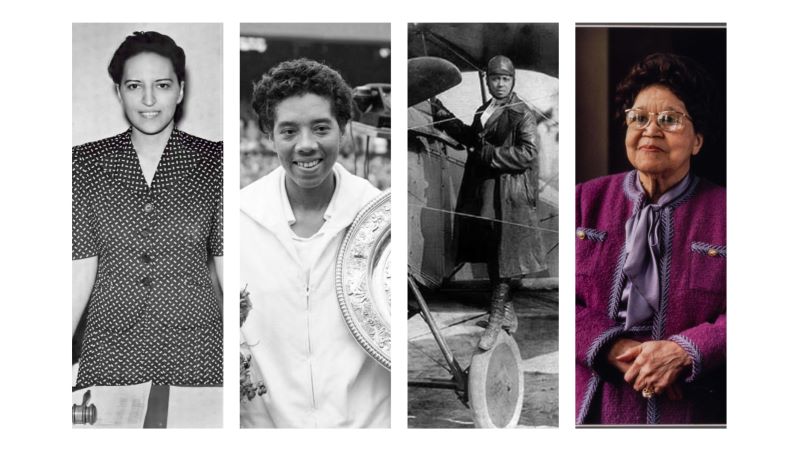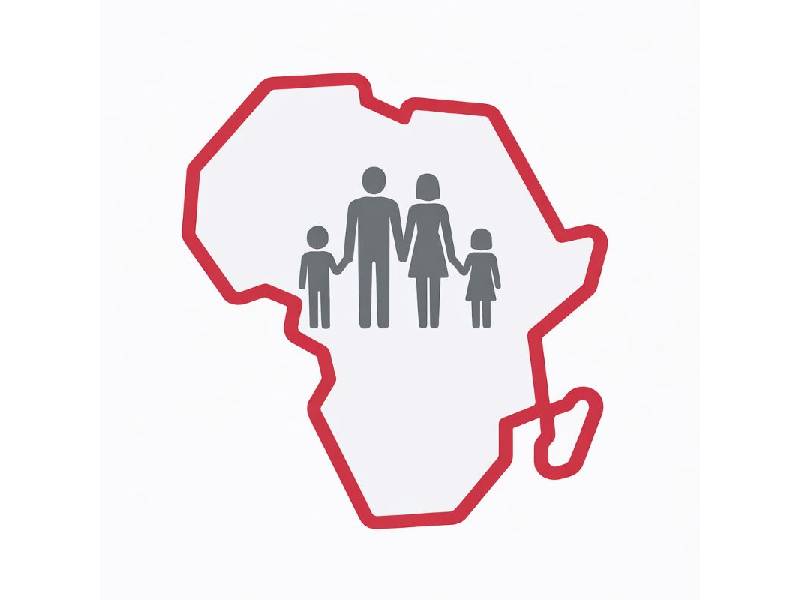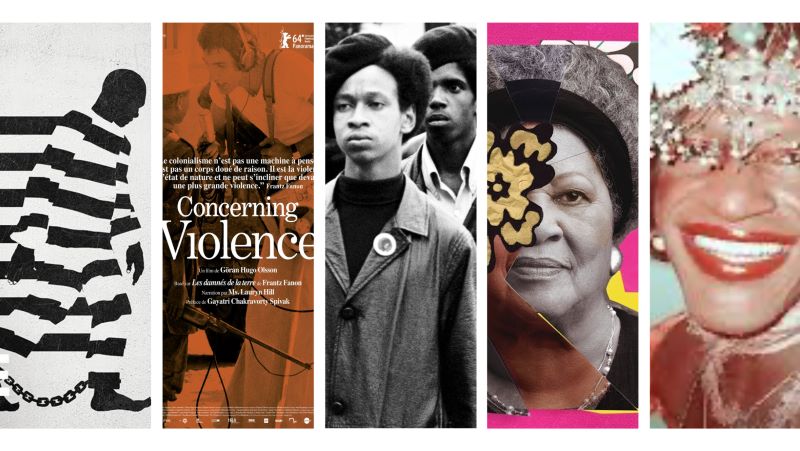Image by rawpixel.com
As a new dawn ushered in this day, the 27th of April 1994, few of us could suppress the welling of emotion, as we were reminded of the terrible past from which we come as a nation; the great possibilities that we now have; and the bright future that beckons us. And so we assemble here today, and in other parts of the country, to mark a historic day in the life of our nation. Wherever South Africans are across the globe, our hearts beat as one, as we renew our common loyalty to our country and our commitment to its future.
-President Nelson Mandela
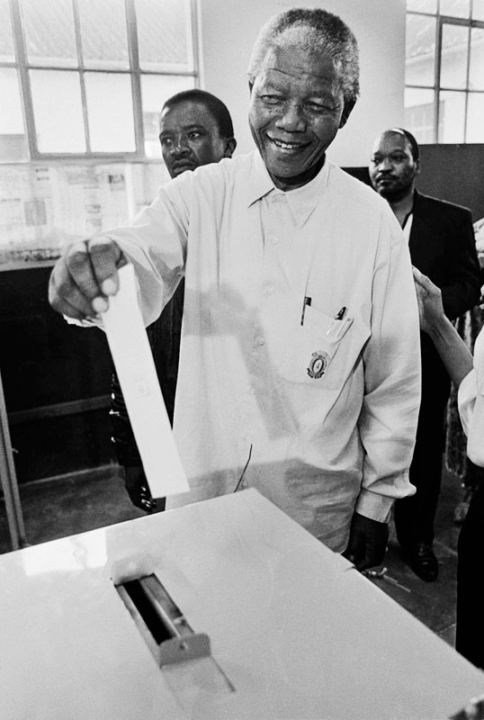
Source: Wikipedia
Every 27 April, South Africa takes the time to acknowledge a pivotal point in its history: the first fully non-racial elections of 1994. Freedom Day is much more than a public holiday; it is a living record of generations of sacrifice, a gauge of democratic health, and a platform for Pan-African solidarity with Africans on the continent and the diaspora. From an international perspective, 2025 will mark 31 years since that momentous vote as citizens of the world, and South Africans are still grappling with shifting perceptions of democracy around the world; Freedom Day, even today, is a powerful symbol of hope, renewal, and shared responsibility.
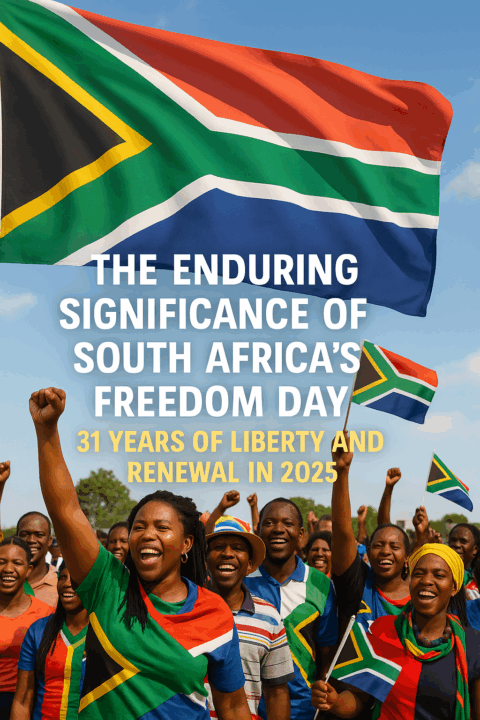
Source: Ai generated
On that brisk fall morning in 1994, millions of South Africans; Black, White, Coloured, and Indian defied decades of oppression to cast their votes for the first time on equal terms. The joy that filled the streets and townships was caught forever in Nelson Mandela’s inspiring words, and it still resonates across generations. Freedom Day in 2025 is not only an anniversary. It is an opportunity to reflect on the distance traveled by the nation, and a chance to recommit to the ideals of democracy, justice, and unity that underwrite the constitutional order in South Africa.
For Africans on the continent, Freedom Day serves as a memory that the fight against colonialism/white minority rule birthed liberation movements everywhere there were colonial regimes, from Accra to Harare. For African Americans, it resonates as a sister chapter on the global struggle for civil rights and equality, creating connections of solidarity from geography to history. As we mark 31 years of Freedom Day in 2025 we look at the beginning points, how we currently observe it, the ongoing challenges, and the potential for regeneration for the generation that is too young to remember apartheid but inherits its legacy.
Origins of Freedom Day:
Freedom Day marks 27 April 1994, when South Africa held its first post-apartheid, non-racial national elections. Nearly 20 million citizens queued for hours at polling stations regardless of race to exercise a right denied for more than three centuries. These historic elections were enabled by the Interim Constitution of 1993, which came into force on the same day, dismantling the legal framework of apartheid and enshrining a Bill of Rights for all South Africans.
The road to Freedom Day was paved by luminaries such as Nelson Mandela, whose release from Victor Verster Prison in 1990 signaled a new dawn; F.W. de Klerk, whose government unbanned the ANC and other liberation movements; and countless activists, from Oliver Tambo’s international advocacy to Desmond Tutu’s moral leadership who kept the global spotlight on South Africa’s injustices. The transition negotiations, marked by both hope and violence, culminated in a new nation defined by its Rainbow flag, a symbol of unity in diversity.
Despite threats from right-wing factions and logistical chaos, the elections proceeded peacefully. As IAN Beresford reported for The Guardian, “Today is a day like no other before it … today marks the dawn of our freedom,” said Mandela, capturing the collective relief and optimism of the nation. At midnight, the old Apartheid flag was lowered, and a new Constitution took effect, ordering the wheels of democracy into motion and enshrining equality under the law.
Freedom Day Celebrations & Traditions:
Each year, the President addresses the nation from Pretoria’s Union Buildings, where a 21-gun salute and the unfurling of the national flag evoke both solemn respect and jubilant celebration. Schoolchildren perform songs in various South African languages; choirs belt out patriotic hymns; and communities host traditional dance and drum performances, celebrating the country’s cultural mosaic. Across provinces, Freedom Day is marked by heritage festivals, museum open doors (e.g., free entry to the Apartheid Museum on 27 April 2025 for all South Africans), and public lectures on reconciliation and nation-building. Media outlets run retrospectives on the liberation struggle, while local radio stations feature survivor testimonies.
International solidarity remains strong. African diasporic organizations host watch parties for the presidential speech, panel discussions on apartheid’s legacy at universities, and church services linking Freedom Day with Juneteenth, America’s own “Freedom Day”, underscoring shared histories of struggle and liberation. Beyond fixed venues, social media campaigns (#FreedomDayZA) amplify voices worldwide, reminding the diaspora that South Africa’s freedom is a universal cause.
The Meaning of Contemporary South Africa:
Freedom Day in 2025 is also a mirror reflecting South Africa’s ongoing challenges. While political rights are secure, socioeconomic disparities persist: poverty remains high, and unemployment exceeds 32 percent nationally, with more than 16 million South Africans relying on monthly welfare grants for survival.
South Africa has built strong institutions since 1994. There are independent courts, an active civil society, and a free press. Recent scandals about state capture, service delivery issues, and public trust, remind us that we need active citizenship to help protect and enhance democracy. Freedom Day can be a moment of reflection each year to renew the commitment to civic engagement and ethical governance. Economically, freedom is still incomplete, too. In 2023, The Gini coefficient identified South Africa as among the most unequal societies in the world. Freedom Day is a platform for advocating for radical economic and social transformation which looks like land reform, increased access to affordable quality education, and job creation. Freedom Day reminds us that freedom without opportunity is a hollow promise for citizens and leaders alike.
Pan-African and Diaspora Perspectives On Freedom Day:
Freedom Day is inseparable from the Pan-African narrative. As Africa Day commemorates the founding of the OAU on 25 May 1963, Freedom Day contributes to the continent’s liberation calendar, reinforcing shared values of unity, non-racialism, and self-determination The similarities between the anti-apartheid struggle and the U.S. civil rights movement are striking. Both movements were non-violent, and both used non-violent protests, legal tools, and moral suasion to challenge systemic racism. Activists and leaders from the United States occupying the space from the Southern Christian Leadership Conference to the NAACP supported sanctions against apartheid, and through this process had relationships grounded in respect and reciprocity. Every Freedom Day, many people in the USA celebrate the legacy of Juneteenth in the context of South Africa’s democratic breakthrough and, indeed, as part of a global mosaic of liberation.
The “Born Free” Generation:
The term “Born Free” describes South Africans who were born after the 1994 election of Nelson Mandela and the formal end of apartheid. These individuals came into a world that was without legally enforced segregation because of race. Estimates put the number of Born Frees at about 40% of South Africa’s 60 million people, making them the largest generational cohort. Nationally, South Africa’s median age is around 29, which is a striking fact in comparison to many Western countries and demonstrates how, demographically, dominate the national profile of South Africa.
Despite enjoying legal freedoms, the Born Free Generation has staggering unemployment rates – an Eye-watering 33% unemployment rate, one of the highest in the world. Youth unemployment (those aged 15 to 24) is a staggering 61. It skyrockets to 71% if you include those no longer attempting to find work.
Born Frees exist in multiple, and sometimes contradictory, cultural worlds. For example, traditional Xhosa and Zulu practices co-exist with global youth subcultures. They express themselves using digital platforms through developing new expressions (music, fashion, social media activism) and new forms of freedom from a post-apartheid frame. Oftentimes, the forms of entrepreneurship and artistic imagination developed by Born Free youth differ from traditional occupations, as innovation is a necessity under these unprecedented economic circumstances.
From the solemn ceremonies in Pretoria to grassroots gatherings across the globe, Freedom Day remains a testament to the power of unity and the enduring quest for justice. As we mark 31 years of democratic renewal in 2025, let us honor the sacrifices of our ancestors by recommitting to the work of building an inclusive South Africa and a more just world.
What does Freedom Day mean to you? Share your reflections, stories, or photos in the comments below, and join the dialogue on Pan-African solidarity and the future of democracy.

Anand Subramanian is a freelance photographer and content writer based out of Tamil Nadu, India. Having a background in Engineering always made him curious about life on the other side of the spectrum. He leapt forward towards the Photography life and never looked back. Specializing in Documentary and Portrait photography gave him an up-close and personal view into the complexities of human beings and those experiences helped him branch out from visual to words. Today he is mentoring passionate photographers and writing about the different dimensions of the art world.


